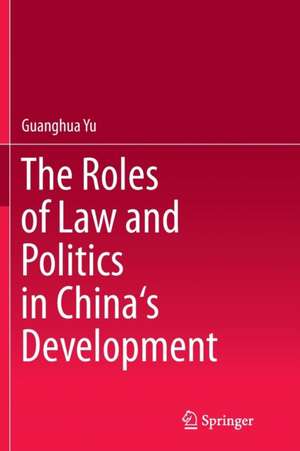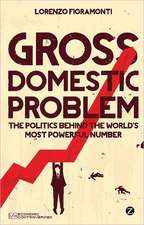The Roles of Law and Politics in China's Development
Autor Guanghua Yuen Limba Engleză Paperback – 3 sep 2016
Chapters explore the relationship between democracy and mechanisms of property rights protection, financial market, rule of law, and human capital accumulation. The author goes on to examine the persistence of authoritarianism, democracy and economic development and the concept of deliberative democracy. This book concludes with a look at future options for China, from political, economic and rule of law perspectives.
The book considers China’s current political regime and analyzes the likely political and constitutional law reforms that are not only conducive to China’s economic development but also beneficial to the enhancement of freedom.
Some knowledge of the Chinese legal system, economy, and political institutions is assumed, making this book valuable to those requiring a deeper understanding of the subject.
The book will appeal to legal scholars and lawyers requiring an understanding of the impact of the Chinese legal system on China’s economic and political development and to scholars and students in political science and economics with an interest in China’s institutional change. Policy makers and administrators with an interest in policy and law making in China will also find this book valuable.
| Toate formatele și edițiile | Preț | Express |
|---|---|---|
| Paperback (1) | 554.98 lei 38-44 zile | |
| Springer Nature Singapore – 3 sep 2016 | 554.98 lei 38-44 zile | |
| Hardback (1) | 565.64 lei 38-44 zile | |
| Springer Nature Singapore – 12 mai 2014 | 565.64 lei 38-44 zile |
Preț: 554.98 lei
Preț vechi: 693.72 lei
-20% Nou
Puncte Express: 832
Preț estimativ în valută:
106.21€ • 110.47$ • 87.68£
106.21€ • 110.47$ • 87.68£
Carte tipărită la comandă
Livrare economică 10-16 aprilie
Preluare comenzi: 021 569.72.76
Specificații
ISBN-13: 9789811013591
ISBN-10: 9811013594
Pagini: 225
Ilustrații: XIII, 212 p.
Dimensiuni: 155 x 235 x 12 mm
Greutate: 0.33 kg
Ediția:Softcover reprint of the original 1st ed. 2014
Editura: Springer Nature Singapore
Colecția Springer
Locul publicării:Singapore, Singapore
ISBN-10: 9811013594
Pagini: 225
Ilustrații: XIII, 212 p.
Dimensiuni: 155 x 235 x 12 mm
Greutate: 0.33 kg
Ediția:Softcover reprint of the original 1st ed. 2014
Editura: Springer Nature Singapore
Colecția Springer
Locul publicării:Singapore, Singapore
Cuprins
Preface.- List of tables.- Acknowledgement.- Chapter 1: Introduction.- Chapter 2: Informal and Formal Contracts.- 2.1: Introduction.- 2.2: The Informal Contractual Arrangements in Wenzhou.- 2.2.1: Direct Private Borrowing.- 2.2.2: Borrowing through the Intermediary of Yinbei.- 2.2.3: Juhui.- 2.2.4: Direct Fund Raising by Enterprises.- 2.3: Formal Contractual Arrangements.- 2.3.1: Bills of Exchange.- 2.3.2: Documentary Credit.- 2.3.3: Secured Lending.- 2.3.3.1: Two cases.- 2.3.3.2: Statistical evidence.- 2.3.3.3: Questionnaire survey.- 2.4: Contract Law Enforcement and Economic Development.-
2.5: Conclusion.- Chapter 3: Contract Enforcement Revisited.- 3.1: Introduction.- 3.2: A Demand-side Analysis.- 3.2.1: Problems with Informal Contract Enforcement.- 3.2.2: The Nature of China’s Economy.- 3.2.3: Liberalization of the Chinese Economy and the Formal Law.- 3.2.3.1: Liberalization of the Economy.- 3.2.3.2: Liberalization of Economic Activities.- 3.2.3.3: Network Effects of the Formal Legal System.- 3.3: A Supply-side Explanation.- 3.3.1: Statistical Evidence.- 3.3.2: A Political Economy Explanation of the Supply-side Expansion.- 3.4: The Survey Results.- 3.5: Conclusion.- Chapter 4: The Role of Mortgages.- 4.1: Introduction.- 4.2: The Device of Mortgages and Formal Law.- 4.3: Mortgages Law and Bank Lending.- 4.3.1: The Legal Framework.- 4.3.1.1: The law of mortgages on immovable property.- 4.3.1.2: The law of mortgages on movable property.- 4.3.2: The Evidence and Explanations.- 4.3.2.1: Evidence on mortgage of immovable property.- 4.3.2.2: Evidence on mortgage of movable property.- 4.3.3: Questionnaire Survey.-
4.4: Conclusion.- Chapter 5: Protective and Non-Protective Functions of Law.- 5.1: Introduction.- 5.2: Inadequate Evidence in Dismissing the Role of Law in Economic Development.- 5.3: Signaling, Self-Commitment and Coordination.- 5.3.1: Signaling.- 5.3.2: Self-commitment.- 5.3.3: Coordination.-
5.3.3.1: Introduction.- 5.3.3.2:Coordination of the Listing of SOEs.- 5.3.3.3: Enforcement of the Anti-Monopoly Law.-
5.3.3.4: Enforcement of Judgments.- 5.4: The Role of Government.- 5.4.1: Introduction.- 5.4.2: Government’s Role on SOEs.- 5.4.3: Government’s Role in TVEs.- 5.4.4: Government’s Role in the Provision of Public Goods.- 5.5: Conclusion.- Chapter 6: Explaining the Persistence of Authoritarianism.- 6.1: Introduction.- 6.2: Modernization.- 6.3: Cultural or Ideological Explanation.- 6.4: The Geo-political Variable.- 6.5: Resilience or Legitimacy.- 6.6: Review of Survey Results.-
6.7: Conclusion.- Chapter 7: Democracy and Economic Development.- 7.1: Introduction.- 7.2: The Relationship between Democracy and Economic Development.- 7.3: The Indirect Effects of Democracy on Economic Development.- 7.3.1: Rights to Property.- 7.3.2: Investment and Finance.- 7.3.3: Rule of Law.- 7.3.4: Education and Human Capital.- 7.4: Indirect Effects and One-Party Rule.- 7.5: Conclusion.- Chapter 8: Towards Deliberative Democracy.- 8.1: Introduction.- 8.2: Motivations Of Takeover Of Corporations And Governments.- 8.2.1: Motivations of Takeover of Corporations.- 8.2.1.1: Seeking Synergy.- 8.2.1.2: Disciplining Managers.- 8.2.1.3: Building Empire.- 8.2.1.4: Exploiting Stakeholders.- 8.2.2: Motivations of Takeover of Governments.- 8.2.2.1: Empire Building.- 8.2.2.2: Overthrowing Repressive Regimes.- 8.2.2.3: Improving Governmental Performance.- 8.2.2.4: Wealth Redistribution.- 8.2.3: A Comparison of the Motivations of Takeover of Corporations and Governments.- 8.3: Information and Expertise of Acquirers.- 8.4: Resources Used and the Possibility of Externalizing the Cost of Takeovers.- 8.5: Measurement of Success or Failure of Takeover of Corporations and Governments.- 8.6: Implications for Regime Choices.- 8.6.1: Legitimacy.- 8.6.2: Democracy.- 8.6.3: Performance.- 8.7: Conclusion.- Chapter 9: Conclusion and Future Options.-
9.1: Political Options.- 9.2: Economic Options.- 9.3: Rule of LawReform Options.- Bibliography.- Index.
2.5: Conclusion.- Chapter 3: Contract Enforcement Revisited.- 3.1: Introduction.- 3.2: A Demand-side Analysis.- 3.2.1: Problems with Informal Contract Enforcement.- 3.2.2: The Nature of China’s Economy.- 3.2.3: Liberalization of the Chinese Economy and the Formal Law.- 3.2.3.1: Liberalization of the Economy.- 3.2.3.2: Liberalization of Economic Activities.- 3.2.3.3: Network Effects of the Formal Legal System.- 3.3: A Supply-side Explanation.- 3.3.1: Statistical Evidence.- 3.3.2: A Political Economy Explanation of the Supply-side Expansion.- 3.4: The Survey Results.- 3.5: Conclusion.- Chapter 4: The Role of Mortgages.- 4.1: Introduction.- 4.2: The Device of Mortgages and Formal Law.- 4.3: Mortgages Law and Bank Lending.- 4.3.1: The Legal Framework.- 4.3.1.1: The law of mortgages on immovable property.- 4.3.1.2: The law of mortgages on movable property.- 4.3.2: The Evidence and Explanations.- 4.3.2.1: Evidence on mortgage of immovable property.- 4.3.2.2: Evidence on mortgage of movable property.- 4.3.3: Questionnaire Survey.-
4.4: Conclusion.- Chapter 5: Protective and Non-Protective Functions of Law.- 5.1: Introduction.- 5.2: Inadequate Evidence in Dismissing the Role of Law in Economic Development.- 5.3: Signaling, Self-Commitment and Coordination.- 5.3.1: Signaling.- 5.3.2: Self-commitment.- 5.3.3: Coordination.-
5.3.3.1: Introduction.- 5.3.3.2:Coordination of the Listing of SOEs.- 5.3.3.3: Enforcement of the Anti-Monopoly Law.-
5.3.3.4: Enforcement of Judgments.- 5.4: The Role of Government.- 5.4.1: Introduction.- 5.4.2: Government’s Role on SOEs.- 5.4.3: Government’s Role in TVEs.- 5.4.4: Government’s Role in the Provision of Public Goods.- 5.5: Conclusion.- Chapter 6: Explaining the Persistence of Authoritarianism.- 6.1: Introduction.- 6.2: Modernization.- 6.3: Cultural or Ideological Explanation.- 6.4: The Geo-political Variable.- 6.5: Resilience or Legitimacy.- 6.6: Review of Survey Results.-
6.7: Conclusion.- Chapter 7: Democracy and Economic Development.- 7.1: Introduction.- 7.2: The Relationship between Democracy and Economic Development.- 7.3: The Indirect Effects of Democracy on Economic Development.- 7.3.1: Rights to Property.- 7.3.2: Investment and Finance.- 7.3.3: Rule of Law.- 7.3.4: Education and Human Capital.- 7.4: Indirect Effects and One-Party Rule.- 7.5: Conclusion.- Chapter 8: Towards Deliberative Democracy.- 8.1: Introduction.- 8.2: Motivations Of Takeover Of Corporations And Governments.- 8.2.1: Motivations of Takeover of Corporations.- 8.2.1.1: Seeking Synergy.- 8.2.1.2: Disciplining Managers.- 8.2.1.3: Building Empire.- 8.2.1.4: Exploiting Stakeholders.- 8.2.2: Motivations of Takeover of Governments.- 8.2.2.1: Empire Building.- 8.2.2.2: Overthrowing Repressive Regimes.- 8.2.2.3: Improving Governmental Performance.- 8.2.2.4: Wealth Redistribution.- 8.2.3: A Comparison of the Motivations of Takeover of Corporations and Governments.- 8.3: Information and Expertise of Acquirers.- 8.4: Resources Used and the Possibility of Externalizing the Cost of Takeovers.- 8.5: Measurement of Success or Failure of Takeover of Corporations and Governments.- 8.6: Implications for Regime Choices.- 8.6.1: Legitimacy.- 8.6.2: Democracy.- 8.6.3: Performance.- 8.7: Conclusion.- Chapter 9: Conclusion and Future Options.-
9.1: Political Options.- 9.2: Economic Options.- 9.3: Rule of LawReform Options.- Bibliography.- Index.
Notă biografică
Dr. Guanghua Yu is Professor of Law, teaching at the Faculty of Law of the University of Hong Kong. His specialized areas of teaching and research include Corporate Law, Contract Law, Constitutional Law, and Public Policy. Over the last 20 years, he has had a prolific academic career, authoring and/or editing more than 8 books, 40 articles and 30 papers spanning different areas of law. As one of the most active Chinese legal scholars, he delivers lectures at a large number of universities in China.
Textul de pe ultima copertă
This book examines China’s economic development from the end of 1970s, integrating perspectives from law, economics and political science. Particular attention is given to the role of formal law and political changes in China’s development, presenting the argument that formal law has made a useful contribution to China’s economic development.
Chapters explore the relationship between democracy and mechanisms of property rights protection, financial market, rule of law, and human capital accumulation. The author goes on to examine the persistence of authoritarianism, democracy and economic development and the concept of deliberative democracy. This book concludes with a look at future options for China, from political, economic and rule of law perspectives.
The book considers China’s current political regime and analyzes the likely political and constitutional law reforms that are not only conducive to China’s economic development but also beneficial to the enhancement of freedom.
Some knowledge of the Chinese legal system, economy, and political institutions is assumed, making this book valuable to those requiring a deeper understanding of the subject.
The book will appeal to legal scholars and lawyers requiring an understanding of the impact of the Chinese legal system on China’s economic and political development and to scholars and students in political science and economics with an interest in China’s institutional change. Policy makers and administrators with an interest in policy and law making in China will also find this book valuable.
Chapters explore the relationship between democracy and mechanisms of property rights protection, financial market, rule of law, and human capital accumulation. The author goes on to examine the persistence of authoritarianism, democracy and economic development and the concept of deliberative democracy. This book concludes with a look at future options for China, from political, economic and rule of law perspectives.
The book considers China’s current political regime and analyzes the likely political and constitutional law reforms that are not only conducive to China’s economic development but also beneficial to the enhancement of freedom.
Some knowledge of the Chinese legal system, economy, and political institutions is assumed, making this book valuable to those requiring a deeper understanding of the subject.
The book will appeal to legal scholars and lawyers requiring an understanding of the impact of the Chinese legal system on China’s economic and political development and to scholars and students in political science and economics with an interest in China’s institutional change. Policy makers and administrators with an interest in policy and law making in China will also find this book valuable.
Caracteristici
Challenges the argument that formal law in China does not contribute to economic development Examines China’s political regime from a multivariable approach Provides answers to China’s economic and political reforms not only conducive to China’s economic development but also beneficial to the enhancement of human freedom Includes supplementary material: sn.pub/extras












